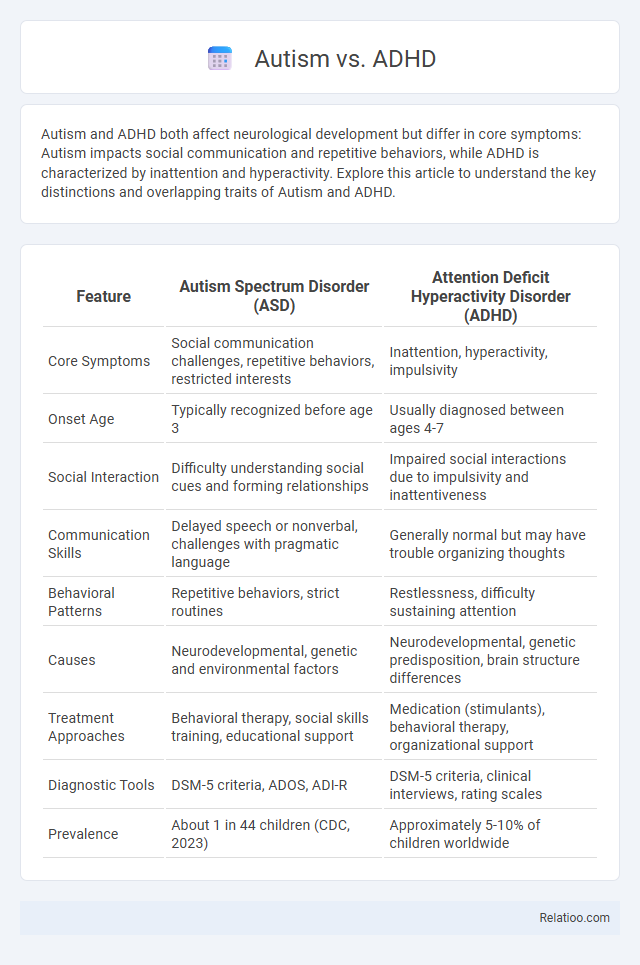Autism and ADHD both affect neurological development but differ in core symptoms: Autism impacts social communication and repetitive behaviors, while ADHD is characterized by inattention and hyperactivity. Explore this article to understand the key distinctions and overlapping traits of Autism and ADHD.
Table of Comparison
| Feature | Autism Spectrum Disorder (ASD) | Attention Deficit Hyperactivity Disorder (ADHD) |
|---|---|---|
| Core Symptoms | Social communication challenges, repetitive behaviors, restricted interests | Inattention, hyperactivity, impulsivity |
| Onset Age | Typically recognized before age 3 | Usually diagnosed between ages 4-7 |
| Social Interaction | Difficulty understanding social cues and forming relationships | Impaired social interactions due to impulsivity and inattentiveness |
| Communication Skills | Delayed speech or nonverbal, challenges with pragmatic language | Generally normal but may have trouble organizing thoughts |
| Behavioral Patterns | Repetitive behaviors, strict routines | Restlessness, difficulty sustaining attention |
| Causes | Neurodevelopmental, genetic and environmental factors | Neurodevelopmental, genetic predisposition, brain structure differences |
| Treatment Approaches | Behavioral therapy, social skills training, educational support | Medication (stimulants), behavioral therapy, organizational support |
| Diagnostic Tools | DSM-5 criteria, ADOS, ADI-R | DSM-5 criteria, clinical interviews, rating scales |
| Prevalence | About 1 in 44 children (CDC, 2023) | Approximately 5-10% of children worldwide |
Understanding Autism and ADHD: Key Definitions
Autism is a neurodevelopmental condition characterized by challenges in social communication and repetitive behaviors, while ADHD involves persistent patterns of inattention, hyperactivity, and impulsivity affecting daily functioning. Both Autism and ADHD fall under the broader category of special needs, which encompasses diverse developmental, physical, and emotional challenges requiring tailored support. Understanding these key definitions helps you recognize unique strengths and needs, promoting effective strategies for intervention and inclusion.
Core Symptoms: Autism vs ADHD
Autism Spectrum Disorder (ASD) primarily involves challenges with social communication, repetitive behaviors, and restricted interests, while Attention Deficit Hyperactivity Disorder (ADHD) is characterized by inattention, hyperactivity, and impulsivity. Core symptoms of Autism affect how you interact socially and process sensory information, whereas ADHD impacts your ability to focus, stay organized, and control impulses. Understanding these distinctions helps tailor support strategies to meet your unique needs.
Diagnostic Criteria and Assessment
Autism Spectrum Disorder (ASD) is diagnosed based on persistent deficits in social communication and restricted, repetitive behaviors as outlined in the DSM-5, while Attention-Deficit/Hyperactivity Disorder (ADHD) requires evidence of inattention and/or hyperactivity-impulsivity that impair functioning across multiple settings. Special needs encompass a broader category, including various physical, developmental, or learning disabilities that necessitate tailored educational or medical support. Your assessment process typically involves multidisciplinary evaluations, including clinical interviews, standardized rating scales, behavioral observations, and cognitive testing to accurately differentiate and diagnose these conditions.
Social Interaction Differences
Autism spectrum disorder often involves challenges with nonverbal communication, understanding social cues, and forming peer relationships, making social interactions uniquely complex. ADHD primarily affects social interaction through impulsivity, inattentiveness, and difficulty regulating emotions, which can lead to misunderstandings or conflicts in social settings. Your understanding of these distinctions helps tailor support strategies that address the specific social needs of individuals with autism, ADHD, or other special needs.
Communication Patterns in Autism and ADHD
Autism spectrum disorder (ASD) often features challenges in nonverbal communication, such as limited eye contact, difficulty interpreting tone or facial expressions, and repetitive speech patterns. In contrast, attention-deficit/hyperactivity disorder (ADHD) typically involves impulsive speech, frequent interruptions, and difficulty staying on topic rather than fundamental deficits in understanding social cues. Special needs encompass a broad range of conditions, but communication difficulties in Autism and ADHD are distinct, with ASD showing more profound social communication impairments compared to ADHD's challenges with attention and executive function affecting conversational flow.
Behavioral Overlaps and Distinctions
Autism, ADHD, and special needs share behavioral overlaps such as difficulties in social interactions and challenges with attention or sensory processing, but each condition presents distinct characteristics; Autism often includes repetitive behaviors and specific communication differences, whereas ADHD primarily involves impulsivity and hyperactivity. Special needs encompass a broader range of developmental or physical disabilities, which may include but are not limited to Autism and ADHD. Understanding these distinctions helps you tailor support strategies to address unique behavioral patterns effectively and improve overall outcomes.
Sensory Processing Differences
Autism, ADHD, and other special needs often involve unique sensory processing differences that affect how individuals perceive and respond to environmental stimuli. Sensory sensitivities in Autism may include hypersensitivity to sounds, lights, or textures, while ADHD-related sensory processing challenges often present as difficulty filtering background stimuli or seeking sensory input through movement. Understanding these sensory differences is crucial for tailoring interventions that support Your comfort and engagement in daily activities.
Treatment and Intervention Approaches
Treatment and intervention approaches for Autism primarily include behavioral therapies such as Applied Behavior Analysis (ABA), speech therapy, and occupational therapy targeting communication and social skills. ADHD interventions focus on a combination of medication management, behavioral therapy, and lifestyle modifications to improve attention, impulse control, and executive functioning. Special needs treatment is highly individualized, encompassing educational support, therapy services, and assistive technologies tailored to each person's unique developmental challenges.
Challenges in Dual Diagnosis
Challenges in dual diagnosis of Autism and ADHD include overlapping symptoms such as inattention, hyperactivity, and social difficulties, which often complicate accurate assessment and intervention planning. Individuals with both conditions may experience heightened sensory sensitivities, executive function deficits, and emotional dysregulation, amplifying difficulties in communication and behavior regulation. Tailored therapeutic approaches must address the unique combination of neurodevelopmental traits to optimize educational and social outcomes effectively.
Supporting Individuals with Autism and/or ADHD
Supporting individuals with Autism and ADHD requires tailored strategies that address sensory sensitivities, communication challenges, and executive functioning difficulties. Your approach should include structured environments, individualized learning plans, and positive behavioral interventions to promote independence and social skills. Access to multidisciplinary support teams, including therapists and educators, enhances outcomes and fosters inclusion in community settings.

Infographic: Autism vs ADHD
 relatioo.com
relatioo.com